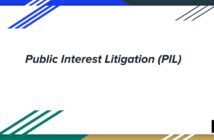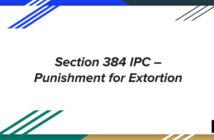Fundamental Right is an essential part of our democracy. Part III of the Indian Constitution contains the fundamental rights guaranteed to all India’s citizens. Some fundamental rights are also provided to non-citizens. It is essential for the development of the people and the country. Legal doctrine is a rule that applies to all legal fields and provides comprehensive ways of resolving legal disputes between the judiciary and the Parliament. One of these doctrines is the Doctrine of Eclipse.
In this article, we will focus on the Doctrine of Eclipse, when it was introduced, What is the doctrine of eclipse under the Indian Constitution, its salient features, how is it different from the doctrine of severability, does it apply to post-constitutional law, its examples and does it apply to non-citizens?
What is the Doctrine of Eclipse?
When a law is inconsistent or in conflict with fundamental rights, it does not become void ab initio. Somewhat, such inconsistent law is overshadowed by the fundamental Right and stays dead until it becomes consistent with that fundamental Right. Once the inconsistency is removed, the law becomes operational. Hence, the fundamental law or Act does not become unenforceable. Only the inconsistent part becomes unenforceable only to the extent of its inconsistency.
The doctrine of Eclipse under the Indian Constitution
Article 13(1) of the Indian Constitution deals with the doctrine of the eclipse. Article 13 of the Constitution states that any law made before the Constitution’s commencement should be consistent with the fundamental rights provided under Part III of the Constitution. Any statute or rule inconsistent with Part III of the Constitution will become null or void. Such a law will not be treated as dead but in a moribund condition (dying State) until the Parliament abolishes it.
Therefore, any law that conflicts with the fundamental rights before the Constitution’s commencement will be treated as void until such inconsistency is removed. The whole law does not become void. Only that part of the law infringes the fundamental Right will be void.
Article 13(2) of the Constitution states that the State should abstain from making any law restricting or taking away the rights guaranteed under Part III of the Constitution. Any law which is made in contravention of this clause, then such laws shall be void to the extent of such contravention.
Who introduced the doctrine of the eclipse?
The Supreme Court introduced the Doctrine of Eclipse in the given landmark case.
Bhikaji Narain Dhakras and Ors. Vs. State of MP (1955)
In this case, the government of MP had passed the C.P. & Berar Motor Vehicles (Amendment) Act, 1947 (“Act”) for the nationalization of motor transport that allowed the provincial government to have a monopoly over the motor transport business in their State. The Petitioner challenged this Act to be violative of Article 19(1)(g) of the Constitution (Freedom to practice any trade or profession and carry out any occupation of their choice). Therefore, the Act becomes void under Article 13(1) of the Constitution and is dead unless it is re-enacted.
The Court had held that as per Article 13, an act is ‘void’ only to the extent it is inconsistent with the fundamental rights. This means that the Act does not become inoperative. The main aim of Article 13(1) is to render part of the Act, which is inconsistent with the fundamental Right, as inactive. Hence, that part is overshadowed by the fundamental Right and remains moribund but not dead. This is called the doctrine of the eclipse. The inconsistency with the fundamental rights eclipses the Act until the eclipse (i.e., the inconsistency) is removed.
After the Constitution (First Amendment), 1951, and modifications in Article 19(6) of the Indian Constitution, the provisions of the impugned (contradictory) Act were no longer inconsistent and therefore, the Act became operative again from the date of the amendment.
Elements of Doctrine of Eclipse
The elements of the doctrine of the eclipse are as follows:
- Pre-constitutional laws – The doctrine of eclipse is only applicable to pre-constitutional laws.
- Non-citizens – If the fundamental Right in question does not apply to the non-citizens, then the doctrine of eclipse will not be applicable to them.
- Violation of fundamental rights – The doctrine of eclipse is applicable only if the fundamental rights are violated and not otherwise.
- Pre-constitutional law becomes moribund and not dead – A pre-constitutional law inconsistent with fundamental rights becomes moribund or inoperative. It does not become dead. Once any amendment removes the inconsistency, it becomes operative or enforceable again.
The Doctrine of Eclipse and Severability
The doctrine of Severability means when a provision of the law contravenes the fundamental rights, then that part of the law which contravenes the fundamental Right would be declared void and the remaining part of the law would remain operative.
Even though the doctrine of severability sounds similar to the doctrine of eclipse, they are different from each other. The primary point of difference is that the doctrine of eclipse makes only the part of the law that is inconsistent with the fundamental rights inoperative or dormant and does not make it void completely. It becomes operative once the inconsistency is removed. On the contrary, the doctrine of severability makes the law inconsistent with the void of the fundamental Right.
The Doctrine of Eclipse and Article 368
Article 368 of the Constitution, which gives power to the Parliament to amend the Constitution, was in question in the given landmark case.
I.C. Golaknath Vs. The State of Punjab, in this case, the Petitioner had contended that his rights under Article 14 (equality before the law), Article 19(f) (repealed) and Article 19(g) (right to practice any profession or carry on any trade, business or occupation) are being violated. However, the Court held that Fundamental rights could not be amended and curtailed the power of the Parliament. Hence, Article 368 of the Constitution was eclipsed.
However, in Kesavananda Bharti Vs. Union of India, 1973, the Court had overruled the above judgment. It declared that the Parliament could amend the fundamental rights guaranteed under Part III of the Indian Constitution so long as it does not alter the basic structure of the Constitution. Therefore, here the eclipse that overshadowed Article 368 was removed.
The Doctrine of Eclipse and Section 309 of IPC
Section 309 of the Indian Penal Code, 1860 (attempt to commit suicide) was challenged in the P. Rathinam Vs. Union of India, 1994. In this case, there was a debate regarding the Right to Die. The Court observed that Article 21 guarantees every citizen’s “right to life” and should include the “right not to live.” Therefore, the Court eclipsed Section 309 of IPC and declared it unconstitutional.
Nevertheless, this judgment was challenged in Gian Kaur Vs. State of Punjab, 1996, and the Court had restored Section 309. Hence, the eclipse cast on Section 309 of IPC was removed.
Does the Doctrine of Eclipse apply to Post Constitutional law?
No, the doctrine of eclipse does not apply to post-constitutional law.
In Deep Chand Vs. the State of Uttar Pradesh, 1959, the Supreme Court stated that any post-constitutional law violating fundamental rights becomes void ab initio. Therefore, the doctrine of eclipse does not apply to post-constitutional laws, and no Constitutional Amendment can make it enforceable.
Is the Doctrine of Eclipse applicable to non-citizens?
The Doctrine of Eclipse does not apply to non-citizens.
In State of Gujrat & Anr. Vs Ambica Mills Ltd., 1974, the Court had held that a non-citizen could not claim that the law is void against them under Article 13(2) of the Indian Constitution. The Court further stated that if a law refrains or removes any fundamental rights of the citizens under Article 19(1)(f), it would be considered void only against the citizens. However, it will be operative for non-citizens. Hence, when any post-constitutional law violates the fundamental rights guaranteed to the citizens only, then the law is operative for the citizens and will be operative for the non-citizens, as the non-citizens do not enjoy the fundamental rights in question.
Case laws
Keshav Madhav Menon Vs. State of Bombay, 1951
In this case, the Appellant was prosecuted under the provisions of the Indian Press (Emergency Powers) Act, 1931(“Act”) for publishing a pamphlet called ‘Railway Mazdooron ke Khilaf Nai Zazish‘ without permission of the authority as required under Section 15(1) of the said Act. The Appellant contended that that pamphlet is published as a “book” under section 1 of the Press and Registration of the Books Act and has duly complied with all the provisions. However, the Respondent contended that the pamphlet is a “new sheet” under Section 2(6) of the Indian Press (Emergency Powers) Act, 1931.
The Constitution of India came into force during the pendency of the proceeding. The Appellant challenged the provisions of Section 2(6), sections 15 and 18 of the Indian Press (Emergency Powers) Act, 1931, as violative of Article 19(1)(a) of the Constitution read with Article 13. Hence, the question arose whether Article 13(1) is retrospective and whether the ‘void’ under Article 13 means’ repeal’.
The Court had held that the Act is violative of Article 19(1)(a) of the Constitution only to the extent of the inconsistency, and the word ‘void’ used in Article 13 does not mean that the law should be repealed entirely. So, the law inconsistent with the fundamental Right does not become void ab initio. It only becomes operative and void.
The Court had further held that any proceedings which were pending at the time of enforcement of the Constitution were not prosecuted and no final judgment was made. A law declared void under Article 13(1) of the Constitution cannot be applicable. Therefore, it must be noted whether the person had committed an offence. Suppose the person commits an offence, and there is a law that makes the Act an offence, and such law has become unenforceable. In that case, the accused cannot be convicted.
Behram Khurshed Pesikaka Vs. State of Bombay, 1954
In this case, the Appellant was convicted under Section 338 of the IPC for causing grievous hurt to three people by driving the car in a rash and negligent manner and under Section 66(b) of the Bombay Prohibition Act (consumption, usage, possession or transport of any intoxicants, hemp or other matters).
The Appellant contended that the Bombay Prohibition Act 1949 was introduced after the commencement of the Constitution, and the Section 13(b) of the Bombay Prohibition Act was declared invalid regarding the consumption or use of liquid medicinal and toilets preparations that contain alcohol in The State of Bombay and Another Vs. F.N. Balsara, 1951. The Court had lifted the prohibition under Sections 13(b) and 66(b) for the consumption or use of liquid medicinal and toilet preparations that contain alcohol. Therefore, these sections were unenforceable and inoperative to that extent.
Hence, the Court held that only a part of the section is declared void or inoperative and not the entire Act. Accordingly, the Court quashed the Appellant’s conviction and ordered the fine refunded.
Conclusion
The Doctrine of Eclipse is the rule which declares that any law which is violative or takes away any fundamental rights guaranteed by the Constitution, then such law will be void until the inconsistency is removed. This doctrine applies to pre-constitutional laws only. It does not apply to non-citizens. The doctrine of eclipse overshadows the law, which is inconsistent with fundamental rights. The law declared inconsistent will become unenforceable or dormant and not dead. The eclipse over the law will be removed once the inconsistency is removed by amendment. However, any post-constitutional law violating fundamental rights becomes void ab initio.

